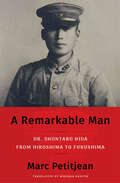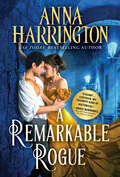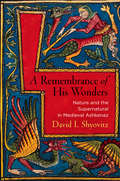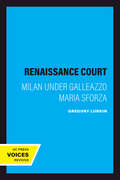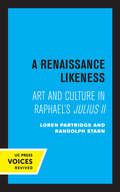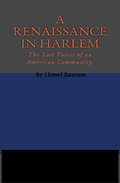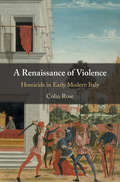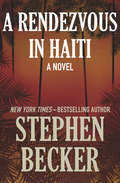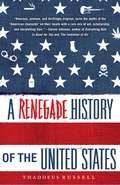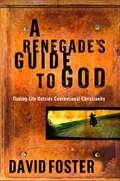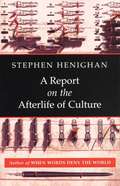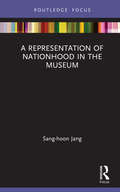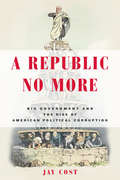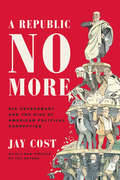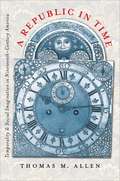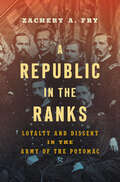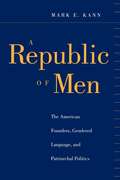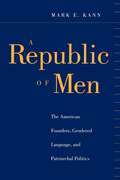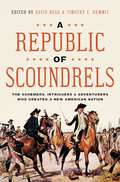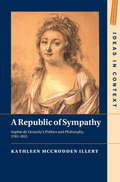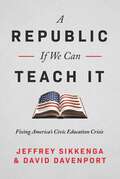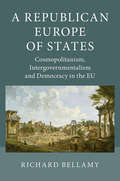- Table View
- List View
A Remarkable Man
by Andrew Murtagh'I can truthfully say that there has never been a nicer man in the game. George Chesterton is a gentleman to the core. And he wasn't a bad bowler either!' Tom Graveney OBE. Wartime pilot dropping supplies over occupied Europe; county cricketer; housemaster teaching and disciplining mischievous teenage boys; family man and civic figure, there have been few dull moments in George Chesterton's life. And he can probably manage to turn even those into amusing anecdotes. Andrew Murtagh tells the story of this remarkable man.
A Remarkable Man: Dr. Shuntaro Hida from Hiroshima to Fukushima
by Marc PetitjeanA poignant, eye-opening portrait of a witness to the atomic bomb who dedicated his life to treating and advocating for radiation survivors.As a young doctor, Shuntaro Hida (1917–2017) played an essential role in the aftermath of the Hiroshima bombing, which he witnessed firsthand only six kilometers from ground zero. Tending to the overwhelming number of victims, he would spend more than sixty years developing an unparalleled understanding of the harmful effects of radiation and warning against the reckless use of nuclear power.Through intimate, thoughtful interviews and compelling reportage, Marc Petitjean has created a worthy tribute to this determined, inspiring man who stood up to complicit governments and businesses. It testifies to the power of individuals to effect change as well as the importance of collective action, as demonstrated by organizations such as Nihon Hidankyo, a survivors&’ group that would receive the 2024 Nobel Peace Prize.
A Remarkable Rogue (Lords of the Armory #5)
by Anna HarringtonIn the dangerous and glittering world of Regency England, no one is safe until you know who to trust.Baroness Sydney Rowland has spent a lifetime keeping secrets. Now that the husband she despised is dead, she'll do anything to get her young son back and protect him however she can. And that includes risking her life when she's coerced into working for a revolutionary group determined to overthrow the government.Captain Nathaniel Reed has heard of Sydney's involvement with Scepter. He's determined to keep the secretive widow at arm's length despite the attraction that burns between them. But when she turns to him for help, nothing will stop him from coming to her aid…"Steamy and luscious. My favorite kind of historical!"—GRACE BURROWES, New York Times bestselling author, for Dukes Are Forever"A touching and tempestuous romance, with all the ingredients Regency fans adore."—GAELEN FOLEY, New York Times bestselling author, for Dukes Are Forever"Action, suspense, seduction."—Library Journal Starred Review for An Inconvenient Duke
A Remembrance of His Wonders: Nature and the Supernatural in Medieval Ashkenaz (Jewish Culture and Contexts)
by David I. ShyovitzThe twelfth and thirteenth centuries witnessed an explosion of Christian interest in the meaning and workings of the natural world—a "discovery of nature" that profoundly reshaped the intellectual currents and spiritual contours of European society—yet to all appearances, the Jews of medieval northern Europe (Ashkenaz) were oblivious to the shifts reshaping their surrounding culture. Scholars have long assumed that rather than exploring or contemplating the natural world, the Jews of medieval Ashkenaz were preoccupied solely with the supernatural and otherworldly: magic and mysticism, demonology and divination, as well as the zombies, werewolves, dragons, flying camels, and other monstrous and wondrous creatures that destabilized any pretense of a consistent and encompassing natural order.In A Remembrance of His Wonders, David I. Shyovitz disputes this long-standing and far-reaching consensus. Analyzing a wide array of neglected Ashkenazic writings on the natural world in general, and the human body in particular, Shyovitz shows how Jews in Ashkenaz integrated regnant scientific, magical, and mystical currents into a sophisticated exploration of the boundaries between nature and the supernatural. Ashkenazic beliefs and practices that have often been seen as signs of credulity and superstition in fact mirrored—and drew upon—contemporaneous Christian debates over the relationship between God and the natural world. In charting these parallels between Jewish and Christian thought, Shyovitz focuses especially upon the mediating role of polemical texts and encounters that served as mechanisms for the transmission of religious doctrines, scientific facts, and cultural mores. Medieval Jews' preoccupation with the apparently "supernatural" reflected neither ignorance nor intellectual isolation but rather a determined effort to understand nature's inner workings and outer limits and to integrate and interrogate the theologies and ideologies of the broader European Christian society.
A Renaissance Court: Milan under Galleazzo Maria Sforza
by Gregory LubkinAmbitious, extravagant, progressive, and sexually notorious, Galeazzo Maria Sforza inherited the ducal throne of Milan in 1466, at the age of twenty-two. Although his reign ended tragically only ten years later, the young prince's court was a dynamic community where arts, policy making, and the panoply of state were integrated with the rhythms and preoccupations of daily life. Gregory Lubkin explores this vital but overlooked center of power, allowing the members of the Milanese court to speak for themselves and showing how dramatically Milan and its ruler exemplified the political, cultural, religious, and economic aspirations of Renaissance Italy.
A Renaissance Likeness: Art and Culture in Raphael's Julius II (Quantum Books)
by Randolph Starn Loren PartridgeThis title is part of UC Press's Voices Revived program, which commemorates University of California Press’s mission to seek out and cultivate the brightest minds and give them voice, reach, and impact. Drawing on a backlist dating to 1893, Voices Revived makes high-quality, peer-reviewed scholarship accessible once again using print-on-demand technology. This title was originally published in 1980.
A Renaissance in Harlem: Lost Voices of An American Community
by Lionel BascomAs part of the WPA Writer's Project, a number of gifted young authors such as Ralph Ellison, Dorothy West and Vivian Morris, created a vibrant record of Harlem's daily life, nightlife and intellectual scene. Lost for decades in the vaults of The Library of Congress, here for the first time are richly atmospheric essays detailing an exciting place, an evocative period and a wonderfully diverse collection of people. Visit with fish vendors, war veterans, Pullman porters, prostitutes, and countless others. Come listen to the memorable sounds of swing music, the singing and shouting of church choirs, and the lonely plea of mournful laundry workers who sing while they work to pass the time while they toil.
A Renaissance of Violence: Homicide in Early Modern Italy
by Colin RoseBased on a close examination of more than 700 homicide trials, A Renaissance of Violence exposes the deep social instability at the core of the early modern states of North Italy. Following a series of crises in the early seventeenth century, interpersonal violence in the region grew to frightening levels, despite the efforts of courts and governments to reduce social conflict. In this detailed study of violence in early modern Europe, Colin Rose shows how major crises, such as the plague of 1630, reduced the strength of social bonds among both elite and ordinary Italians. As a result, incidents of homicidal violence exploded - in small rural communities, in the crowded urban center and within tightly-knit families. Combining statistical analysis and close reading of homicide patterns, Rose demonstrates how the social contexts of violence, as much as the growth of state power, can contribute to explaining how and why interpersonal violence grew so rapidly in North Italy in the seventeenth century.
A Rendezvous in Haiti: A Novel
by Stephen BeckerTwo veterans of World War I fight for love and honor in a Caribbean country torn apart by rebellion Lt. Robert McAllister of the US Marines first encounters Paul Blanchard on a parade ground in Belgium in 1918. Awarded the Croix de Guerre and the Victoria Cross for his service at Ypres and Passchendaele, the British sergeant coughs blood onto his commanding officer&’s boots and curses the war. A year later, McAllister commands a platoon of marines in occupied Haiti, where a peasant uprising threatens to topple the American-backed regime. Led by a charismatic revolutionary named Martel, the rebels, known as the Cacos, have a secret weapon: a white Caco who fights with a terrifying combination of cunning and courage. When the mysterious mercenary abducts a marine colonel&’s daughter, McAllister rushes to save her. It is more than his duty—he and Caroline Barbour are in love. The deeper he journeys into enemy territory, however, the more McAllister realizes how little he understands, not just about this country of breathtaking beauty and staggering violence, but about his own heart&’s desire. The biggest shock of all, though, waits for him at the end of the jungle trail: Paul Blanchard, hero of the Great War. Rich in the exotic colors of the Caribbean, A Rendezvous in Haiti is an enthralling tale of adventure, romance, and rebellion from master storyteller Stephen Becker.
A Rendezvous with Colorado History
by Dorothy Dutton Caryl HumphriesRose onyx is a very rare marble and has not been found anywhere else in the world. Almost all of the rose onyx found was used to complete the capitol building.
A Renegade History of the United States: How Drunks, Delinquents, And Other Outcasts Made America
by Thaddeus RussellIn this groundbreaking book, noted historian Thaddeus Russell tells a new and surprising story about the origins of American freedom. Rather than crediting the standard textbook icons, Russell demonstrates that it was those on the fringes of society whose subversive lifestyles helped legitimize the taboo and made America the land of the free. In vivid portraits of renegades and their “respectable” adversaries, Russell shows that the nation’s history has been driven by clashes between those interested in preserving social order and those more interested in pursuing their own desires—insiders versus outsiders, good citizens versus bad. The more these accidental revolutionaries existed, resisted, and persevered, the more receptive society became to change. Russell brilliantly and vibrantly argues that it was history’s iconoclasts who established many of our most cherished liberties. Russell finds these pioneers of personal freedom in the places that usually go unexamined—saloons and speakeasies, brothels and gambling halls, and even behind the Iron Curtain. He introduces a fascinating array of antiheroes: drunken workers who created the weekend; prostitutes who set the precedent for women’s liberation, including “Diamond Jessie” Hayman, a madam who owned her own land, used her own guns, provided her employees with clothes on the cutting-edge of fashion, and gave food and shelter to the thousands left homeless by the 1906 San Francisco earthquake; there are also the criminals who pioneered racial integration, unassimilated immigrants who gave us birth control, and brazen homosexuals who broke open America’s sexual culture. Among Russell’s most controversial points is his argument that the enemies of the renegade freedoms we now hold dear are the very heroes of our history books— he not only takes on traditional idols like John Adams, Thomas Jefferson, Andrew Carnegie, John Rockefeller, Thomas Edison, Franklin Roosevelt, and John F. Kennedy, but he also shows that some of the most famous and revered abolitionists, progressive activists, and leaders of the feminist, civil rights, and gay rights movements worked to suppress the vibrant energies of working-class women, immigrants, African Americans, and the drag queens who founded Gay Liberation. This is not history that can be found in textbooks— it is a highly original and provocative portrayal of the American past as it has never been written before.
A Renegade's Guide to God: Finding Life Outside Conventional Christianity
by David FosterDynamic speaker and author Foster leads Christians to an untamed, unpredictable relationship with the ultimate renegade of all time -- Jesus.
A Report on China’s Administration Reform (Research Series on the Chinese Dream and China’s Development Path)
by Yukai WANGThis book traces the history of China’s administrative reform in the past 35 years, focusing on the three phases of development, four guidelines and five major tasks of the reform since it is of great value to depict the entire process of China’s administrative system reform, analyzing the achievements, problems and prospects of the reform, and exploring experiences and lessons from the relationship between the administrative system reform and China’s economic, social and government transformation.
A Report on the Afterlife of Culture
by Stephen HenighanIn this essay collection, Henighan ranges across continents, centuries and linguistic traditions to examine how literary culture and our perception of history are changing as the world grows smaller. He weaves together daring literary criticism with front-line reporting on events such as the end of the Cold War in Poland and African reactions to the G8 Summit.
A Representation of Nationhood in the Museum: The National Museum of Korea (Routledge Research on Museums and Heritage in Asia)
by Sang-hoon JangA Representation of Nationhood in the Museum examines how the National Museum of Korea, as a national repository of material culture and the state’s premier exhibition facility, has shaped and been shaped by Korean nationalism. Exploring the processes by which the museum has discovered and interpreted material culture, using concepts of ethnic nationalism in the historical and political contexts of South Korean society, the book analyses how this nationalist interpretation has regulated South Koreans’ understanding of their material culture. Issues considered include: cultural and political relations with China; Japanese colonial rule, cultural imperialism and its legacy; the division of Korea since 1945; the Korean War and nation building since liberation in 1945; and domestic political upheavals, including military coups in 1961 and in 1979. Demonstrating that authoritarian regimes’ emphasis on the promotion of national unity drove national museums to establish national identity through material culture, Jang argues that international political and diplomatic factors also affect the process of the formation of national identity in a specific political context. Concerning itself with issues such as the relationship between politics and identity, museums and authoritarian regimes, this book should be essential reading for academics, researchers and postgraduate students in museum studies, nationalism studies, Asian studies and history departments.
A Republic No More
by Jay CostAfter the Constitutional Convention, Benjamin Franklin was asked, "Well, Doctor, what have we got-a Republic or a Monarchy?" Franklin's response: "A Republic-if you can keep it."This book argues: we couldn't keep it.A true republic privileges the common interest above the special interests. To do this, our Constitution established an elaborate system of checks and balances that separates power among the branches of government, and places them in conflict with one another. The Framers believed that this would keep grasping, covetous factions from acquiring enough power to dominate government. Instead, only the people would rule.Proper institutional design is essential to this system. Each branch must manage responsibly the powers it is granted, as well as rebuke the other branches when they go astray. This is where subsequent generations have run into trouble: we have overloaded our government with more power than it can handle. The Constitution's checks and balances have broken down because the institutions created in 1787 cannot exercise responsibly the powers of our sprawling, immense twenty-first century government.The result is the triumph of special interests over the common interest. James Madison called this factionalism. We know it as political corruption.Corruption today is so widespread that our government is not so much a republic, but rather a special interest democracy. Everybody may participate, yes, but the contours of public policy depend not so much on the common good, but rather the push-and-pull of the various interest groups encamped in Washington, DC.
A Republic No More: Big Government and the Rise of American Political Corruption
by Jay CostAfter the Constitutional Convention, Benjamin Franklin was asked, "Well, Doctor, what have we got-a Republic or a Monarchy?" Franklin's response: "A Republic-if you can keep it."This book argues: we couldn't keep it.A true republic privileges the common interest above the special interests. To do this, our Constitution established an elaborate system of checks and balances that disperses power among the branches of government, which it places in conflict with one another. The Framers believed that this would keep grasping, covetous factions from acquiring enough power to dominate government. Instead, only the people would rule.Proper institutional design is essential to this system. Each branch must manage responsibly the powers it is granted, as well as rebuke the other branches when they go astray. This is where subsequent generations have run into trouble: we have overloaded our government with more power than it can handle. The Constitution's checks and balances have broken down because the institutions created in 1787 cannot exercise responsibly the powers of our sprawling, immense twenty-first-century government.The result is the triumph of special interests over the common interest. James Madison called this factionalism. We know it as political corruption.Corruption today is so widespread that our government is not really a republic, but rather a special interest democracy. Everybody may participate, yes, but the contours of public policy depend not so much on the common good, as on the push-and-pull of the various interest groups encamped in Washington, DC.
A Republic in Time
by Thomas M. AllenThe development of the American nation has typically been interpreted in terms of its expansion through space, specifically its growth westward. In this innovative study, Thomas Allen posits time, not space, as the most significant territory of the young nation. He argues that beginning in the nineteenth century, the actual geography of the nation became less important, as Americans imagined the future as their true national territory.Allen explores how transformations in the perception of time shaped American conceptions of democratic society and modern nationhood. He focuses on three ways of imagining time: the romantic historical time that prevailed at the outset of the nineteenth century, the geological "deep time" that arose as widely read scientific works displaced biblical chronology with a new scale of millions of years of natural history, and the technology-driven "clock time" that became central to American culture by century's end. Allen analyzes cultural artifacts ranging from clocks and scientific treatises to paintings and literary narratives to show how Americans made use of these diverse ideas about time to create competing visions of American nationhood.
A Republic in the Ranks: Loyalty and Dissent in the Army of the Potomac (Civil War America)
by Zachery A. FryThe Army of the Potomac was a hotbed of political activity during the Civil War. As a source of dissent widely understood as a frustration for Abraham Lincoln, its onetime commander, George B. McClellan, even secured the Democratic nomination for president in 1864. But in this comprehensive reassessment of the army's politics, Zachery A. Fry argues that the war was an intense political education for its common soldiers. Fry examines several key crisis points to show how enlisted men developed political awareness that went beyond personal loyalties. By studying the struggle between Republicans and Democrats for political allegiance among the army's rank and file, Fry reveals how captains, majors, and colonels spurred a pro-Republican political awakening among the enlisted men, culminating in the army's resounding Republican voice in state and national elections in 1864.For decades, historians have been content to view the Army of the Potomac primarily through the prism of its general officer corps, portraying it as an arm of the Democratic Party loyal to McClellan's leadership and legacy. Fry, in contrast, shifts the story's emphasis to resurrect the successful efforts of proadministration junior officers who educated their men on the war's political dynamics and laid the groundwork for Lincoln's victory in 1864.
A Republic of Men: The American Founders, Gendered Language, and Patriarchal Politics
by Mark E. KannWhat role did manhood play in early American Politics? In A Republic of Men, Mark E. Kann argues that the American founders aspired to create a "republic of men" but feared that "disorderly men" threatened its birth, health, and longevity. Kann demonstrates how hegemonic norms of manhood–exemplified by "the Family Man," for instance--were deployed as a means of stigmatizing unworthy men, rewarding responsible men with citizenship, and empowering exceptional men with positions of leadership and authority, while excluding women from public life. Kann suggests that the founders committed themselves in theory to the democratic proposition that all men were created free and equal and could not be governed without their own consent, but that they in no way believed that "all men" could be trusted with equal liberty, equal citizenship, or equal authority. The founders developed a "grammar of manhood" to address some difficult questions about public order. Were America's disorderly men qualified for citizenship? Were they likely to recognize manly leaders, consent to their authority, and defer to their wisdom? A Republic of Men compellingly analyzes the ways in which the founders used a rhetoric of manhood to stabilize American politics.
A Republic of Men: The American Founders, Gendered Language, and Patriarchal Politics
by Mark E. KannWhat role did manhood play in early American Politics? In A Republic of Men, Mark E. Kann argues that the American founders aspired to create a "republic of men" but feared that "disorderly men" threatened its birth, health, and longevity. Kann demonstrates how hegemonic norms of manhood–exemplified by "the Family Man," for instance--were deployed as a means of stigmatizing unworthy men, rewarding responsible men with citizenship, and empowering exceptional men with positions of leadership and authority, while excluding women from public life. Kann suggests that the founders committed themselves in theory to the democratic proposition that all men were created free and equal and could not be governed without their own consent, but that they in no way believed that "all men" could be trusted with equal liberty, equal citizenship, or equal authority. The founders developed a "grammar of manhood" to address some difficult questions about public order. Were America's disorderly men qualified for citizenship? Were they likely to recognize manly leaders, consent to their authority, and defer to their wisdom? A Republic of Men compellingly analyzes the ways in which the founders used a rhetoric of manhood to stabilize American politics.
A Republic of Scoundrels: The Schemers, Intriguers, and Adventurers Who Created a New American Nation
by David Head Timothy C. HemmisThe Founding Fathers are often revered as American saints; here are the stories of those Founders who were schemers and scoundrels, vying for their own interests ahead of the nation&’s.We now have a clear-eyed understanding of Founding Fathers such as George Washington, Benjamin Franklin, Thomas Jefferson, and Alexander Hamilton; even so, they are often considered American saints, revered for their wisdom and self-sacrificing service to the nation. However, within the Founding Generation lurked many unscrupulous figures—men who violated the era&’s expectation of public virtue and advanced their own interests at the expense of others. They were turncoats and traitors, opportunists and con artists, spies, and foreign intriguers. Some of their names are well known: Benedict Arnold and Aaron Burr. Others are less notorious now but were no less threatening. There was Charles Lee, the Continental Army general who offered to tell the British how to defeat the Americans, and James Wilkinson, who served fifteen years as a commanding general in the US Army, despite rumors that he spied for Spain and conspired with traitors. The early years of the republic were full of self-interested individuals, sometimes succeeding in their plots, sometimes failing, but always shaping the young nation. A Republic of Scoundrels seeks to re-examine the Founding Generation and replace the hagiography of the Founding Fathers with something more realistic: a picture that embraces the many facets of our nation&’s origins.
A Republic of Sympathy: Sophie de Grouchy's Politics and Philosophy, 1785–1815 (Ideas in Context)
by Kathleen McCrudden IllertSophie de Grouchy was a political philosopher and activist practising at the centre of Revolutionary events in France between 1789 and 1815. Despite this, her contributions to the development of political thought are often overlooked, with Grouchy commonly falling under the shadow of her husband Nicolas de Caritat, the marquis de Condorcet. A Republic of Sympathy instead situates Grouchy as a significant figure among her contemporaries, offering the first complete exploration of her shifting thought and practice across this period of societal upheaval. Kathleen McCrudden Illert analyses texts newly attributed to Grouchy and examines her intellectual collaborations, demonstrating how Grouchy continued to develop a unique philosophy which placed sympathy as the glue between the individual and the political community. The study also explores Grouchy's connections with her peers and interlocutors, from Adam Smith and Jean-Jacques Rousseau, to Thomas Paine and Jacques Pierre Brissot. In doing so, it argues powerfully for Grouchy's reintegration into the history of European political thought.
A Republic, If We Can Teach It: Fixing America's Civic Education Crisis
by David Davenport Jeffrey SikkengaAmerica faces a crisis in civic education that imperils the long-term health of our country. Too many Americans—especially young people—do not have the knowledge of our history and principles necessary to sustain our republic.Recent national test results reveal the sad state of civic education in our schools. The 2022 report of the National Assessment of Educational Progress showed that only 22 percent of eighth graders tested were &“proficient&” or better in their knowledge of civics, and proficiency in US history dropped to an anemic 13 percent. The Annenberg Policy Center reported in 2019 that only 39 percent of Americans could name the three branches of government, while its 2017 study showed that 37 percent could not name a single right in the First Amendment. How can we &“keep&” a republic, as Benjamin Franklin put it, if we don&’t know what a republic is? At a deeper level, the crisis is not simply about facts and information. If the next generations of Americans do not come to understand that our history and principles are good and that they merit their affection, our experiment in self-government could fail. Action is needed now to reverse the trend.
A Republican Europe of States: Cosmopolitanism, Intergovernmentalism and Democracy in the EU
by Richard BellamyCombining international political theory and EU studies, Richard Bellamy provides an original account of the democratic legitimacy of international organisations. He proposes a new interpretation of the EU's democratic failings and how they might be addressed. Drawing on the republican theory of freedom as non-domination, Bellamy proposes a way to combine national popular sovereignty with the pursuit of fair and equitable relations of non-domination among states and their citizens. Applying this approach to the EU, Bellamy shows that its democratic failings lie not with the democratic deficit at the EU level but with a democratic disconnect at the member state level. Rather than shifting democratic authority to the European Parliament, this book argues that the EU needs to reconnect with the different 'demoi' of the member states by empowering national parliaments in the EU policy-making process.

